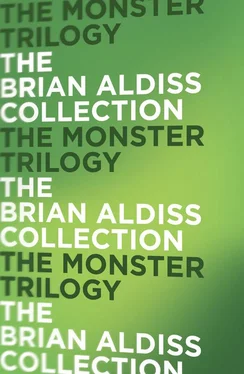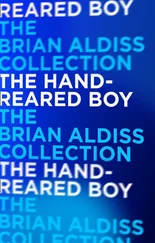‘Now we’re in trouble – real trouble, you understand? What are you going to do with the body? You’ll be charged with murder.’
‘I’ll come down, Bram,’ said Bodenland. It was the first time he had used his host’s Christian name.
‘Better stay where you are. There’s another presence out here.’
‘What?’
Stoker paused before answering, and glanced about.
‘A woman’s presence. I’ll be in soonest, don’t worry. I’ll heave this damned corpse back into the shed. We’ll worry about it in the morning.’
‘Are you frightened?’
‘Heroism, Bodenland, what we were talking about. Get to bed, and sweet dreams. And you, doctor.’
Bodenland withdrew his head and closed the window, but stood looking at the silent terrace. When Stoker disappeared, dragging the corpse, he returned to bed. But hope of sleep had been shattered.
Although he admired Stoker’s courage, he still could not persuade himself to believe in vampires. His experience told him they existed, his intellect denied it. Of course, that paradox played to the advantage of vampires, if they existed. But they did exist – and somehow below the level of human intellect.
He paced about the room, trying to work it out. The human intellect originated in the neocortex, the grey matter of the brain. Below lay deeper layers, much older on an evolutionary scale than the neocortex – layers of brain common to other mammals, the limbic brain, primed by instincts such as aggression and submission and sexual response: the very instincts which propelled the processes of life on the planet.
Suppose there was a type of creature which was subject to different processes. A creature like a vampire, without intellect, and therefore almost safe from human molestation. The human species would undoubtedly kill off all vampires, as they had almost killed off wolves, if they only could believe wholeheartedly in the idea. Once you got the idea, vampires were not particularly hard to kill – to exterminate. Were they? The silver bullet. The shaft of light. The religious symbol. The stake through the heart.
He stood and stared abstractedly at the pokerwork legend: Thou Shalt Not be Afraid for Any Terror by Night … Nevertheless, the human race was afraid, always had been …
Always had been …
Vampires – if they existed – he could not resist adding the saving clause – were older than mankind.
How much older? Really millions and millions of years older, as Clift’s discovery seemed to prove?
Why were they so feared?
They were a disease.
They brought death. Worse than death, the existence of the Undead. If legend was to be believed.
And they preyed on humankind by activating one of the strongest instincts below the neocortical level, the great archetype of sex.
As a flower attracts by its scent.
His dream … The incestuous dream of union with Kylie, dead or alive. Repugnant to his consciousness, evidently delightful to some more primitive layer of sensation …
Of a sudden, he connected the dream with the female presence which, if Stoker was to be believed, walked on the terrace below.
As he thought of it, of that shadowy thing he was wise to dread, a wave of desire came over him.
He fought it back. ‘The pestilence that walketh in darkness …’ Was that how the rest of the psalm went?
To calm himself, he measured his strides about the bedroom, trying again to think of the problem scientifically.
Why else were vampires so feared?
Because they were parasitical. Parasites were always feared.
If they long preceded humans on the scale of existence, then they had once preyed on other living things.
What had they been – he caught himself avoiding the word – what had vampires been before they became parasitical? Before that dreadful need for blood arose?
Many arthropod bloodsuckers existed – bed bugs, fleas, mosquitoes, ticks, all parasitical on man. As the fossil record proved, those creatures were about in the busy world long before mankind. Even before birds and mammals.
All those little plagues to human life were originally innocent suckers of fruit juice and plant juices. But the taste of blood proved addictive and they had become enslaved by parasitism.
Blood was a dangerous beverage. An addiction like any other drug.
And vampire bats …
So what had vampires been, many millions of years ago, before they became enslaved?
It was a short distance from gnawing on a wound to drinking its substance … From swooping down through the air to being called to swoop … From inciting the dread to inciting the lust …
Almost in a fever, he thought he had glimpsed what turned an aerial predator into the pestilence that walketh in darkness. Sick with the sound and smell of the gas jet, Bodenland went to the window and flung back the curtains, letting moonlight enter the fuggy room. Brushing away the strings of white flowers, he threw open the window and took some lungfuls of air.
The moon still floated upside down in the pool.
Of Stoker there was no sign.
The woman stood there on the terrace, tall against the figure of a putti. She looked up at him, eyes agleam with a cold green fire.
His heart turned over. But his intellect remained cool.
Distantly, the clock in the asylum tower chimed one in the morning.
She lifted her arms and flew up to him.
She was in the bedroom, among the domestic things with her dead eyes, walking, gliding, rather. Close to him – and he staring with his hair standing on end.
‘This is no dream, Joe,’ she said. Her voice was deep and masculine.
She brought a chill to the room. In her whiteness, with something sparkling like frost in her hair, and the wan white robe, all shadowy yet bright – why, he thought, it’s more like a fever than a person, frightening, yes, yet no more dangerous than a ghost … Yet he was in a prickle of lust to be touched by her, to enjoy an intimacy no one knew this side of the grave.
His intellect had no part in this encounter.
Her name was Bella, the name spoken like a bell.
‘What do you want of me?’
‘I know what you want of me, Joe.’ Still the voice was thick, as if there was blood just below the throat. And her lips were red.
She began to talk, and he to listen, entranced.
Her people were ancient and had survived much. When oak trees die, they still stand against the storm. Her exact words never came back to him after; he only recalled – trying to recall more – that she gave an impression of the Undead as being nothing outside nature, as being of nature. Of humans as being the exiled things, cut off from the ancient world, unable to throw themselves into the streams of continuity pouring from the distant past into distant futures. She spoke, and it was in images.
For these reasons humanity was doomed. Men had to be slain for the survival of the ancient planet. Yet she, Bella, had it in her power to save him, Joe. To more than save him: to crown him with eternal life, the great stream of life from which his humanity exiled him. She spoke, and he received a picture of glaciers from which pure rivers flowed, down to teeming future oceans, unpolluted by man.
‘What do I have to do?’ His whisper was like the rustle of leaves.
Bella turned the full beam of her regard upon him. The eyes were red like a dog’s or yellow like a cat’s or green like a polar bear’s – after, he could not remember. They pierced into him, confident, without conscience or consciousness.
‘All Fleet Ones need to attend a great conference which our Lord has called. We are summoned, every one. We must go to the region you call Hudson Bay. There we will finally decide mankind’s fate.’
‘You cannot exist without us.’
Читать дальше












